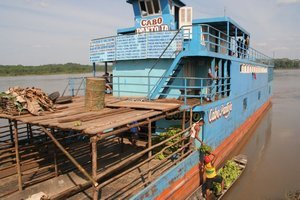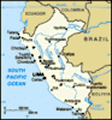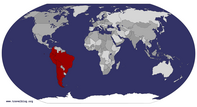Advertisement
Published: August 21st 2009

 The Cabo Pantoja
The Cabo Pantoja
Photo pilfered from Google. Apologies.
Guildenstern: "I know."
Rosencrantz: "Do you think Death could possibly be a boat?"
Guildenstern: "No, no, no. Death is not. Death isn't. Take my meaning? Death is the ultimate negative. Not being. You can't not be on a boat."
Rosencrantz: "I've frequently not been on boats."
Guildenstern: "No, no. What you've been is not on boats."
Rosencrantz: "I wish I was dead. I could jump over the side. That'll put a spoke in their wheel!"
Guildenstern: "Unless they're counting on it."
Rosencrantz: "I shall remain on board. That'll put a spoke in their wheel!"
Tom Stoppard - Rosencrantz and Guildenstern Are Dead Human Cargo
With Iquitos behind, the Cabo Pantoja cruises up the river into the night. I stand at the front of the top deck and lean over the railing to look down at the oncoming water that breaks against the side of the cargo boat. Except for this faintly visible flurry of white turbulence, the river and jungle are completely dark.
Behind me, Captain Paisano is chatting with someone in the control room while he guides the vessel upstream. One of the crew members stands down in front of the control room with a large spotlight. Every few minutes, he switches it on and swings the broad beam from bank to bank so that the captain can keep stock of our position on this relatively narrow stretch of the Napo.
Behind the control room, the door to the captain's private cabin is open. Inside, one of the crew is grilling fresh fish on an electric stove for their dinner. It smells great.
The captain hands control over to someone and walks down to the deck and to his cabin. He shoos the temporary chef from the room and shuffles through some papers on the small desk.
"Psst, Paisano," he says to me.
"Yeah?" I ask.
"Do you have your passport with you?"
"Yeah."
He motions for me to come into the cabin. I step into the doorway and pull my passport from the side pocket of my cargo pants.
Cargo pants on a cargo boat, of course.
Above the desk/stove setup on a shelf in the wall is the boat's communications radio the intermittently crackles with static. Mounted into the opposite wall is a narrow bunk bed with a duffle bag crammed underneath. This room has everything.
The captain holds out his hand for my passport.
"Need your details for the manifest," he says.
I hand it to him. He opens it and studies the details. Holding it down on the table with one hand, he begins to scribble in the manifest.
"Anthony Michael," he says, writing my name. He then makes an attempt to pronounce the surname - a tattered collection of letters ground through centuries of Germanic, Dutch, and Anglo-Saxon machinery to be delivered onto a humble continent of perplexed Spanish speakers. He gives up and just writes it down.
"And you're going where? Pantoja?"
"Yep."
"Paaann...toooo...ja. Ok so that's 90 soles."
I give him the cash and he puts it into a lockbox under the desk. This is equivalent to $30 USD for six days on the boat - food included. Not a bad deal.
"There you go," he says, handing back my passport along with a strip of paper. "That's your ticket, you'll need to take it with you to the kitchen for meals."
I thank him, and then again more profusely for having saved my backpack from the clutches of the thieving cockroach back in port.
"Paisanos, paisanos," he says with a dismissive wave of his hand. He takes a moment to turn the grilling fish and then scurries out of the cabin and back to the control room.
I return to the railing to stare out into the void a while longer, then squeeze past the sleeping passengers to my hammock and fall asleep.
-
In the morning, I slowly awake to the sound of people walking around and talking. I lie there for a while half-asleep - faintly aware that there is no hurry to get up for the next several days. I come to full wakefulness upon realizing that my ass is freezing. I open my eyes and see a grey, overcast sky. I notice that my hammock is hanging quite a bit lower than those of my neighbors. I move around and notice that my ass is cold because it is resting on the metal floor of the cabin.
I scramble to sit up, slip on my flip-flops, and stand to inspect the situation.
The knots in the nylon cords have held. But apparently everything has stretched under my weight in the night. I untie the cords and raise my hammock back up to a decent level. Better.
The next thing I become aware of is my bladder. I duck under the hammocks and head to the stairs and down to the second deck where the bathrooms are.
At the bottom of the stairs, I meet a small boy of about six years of age. Seeing my pale skin and blond hair, he stares up at me with his mouth hanging open. As I pass him, he spins around to continue staring. It's ok, kid. I'm not a ghost.
Unlike the top deck, the second deck is completely walled in with small windows just below the low ceiling. This cabin is even more crowded. In addition to the two rows of people crammed in shoulder to shoulder, a few hammocks are hanging perpendicular to the rows against the outer walls in the walking space. To get through, I have to duck down as well as squeeze by. At the back of the cabin, there is a small, walled off room. This is the kitchen. I can see cooks already busy making lunch through a little arched window.
Beyond the kitchen, there is a short passage with four doors on either side. I open one and see a shower consisting of a piece of pipe sticking out of the wall with a valve fixed in its side.
Checking the door across the passage, I find a toilet. The small porcelain bowl sits in the corner without a tank behind it. Another pipe leads down from the ceiling and into a fixture on the back. There is no seat. The rim is covered in urine and grime, as is the floor fed by a leaky seal at the base of the toilet. I step carefully into the stall and close the door behind me. I do my business and make a resolution to conserve water in order to repeat this experience as rarely as possible. I may need to cut down on fiber, as well.
I return to my hammock and sink back into it. With nothing else to do, I soon doze off.
-
Early in the afternoon, the soldier to my right nudges my arm. I look at him and he waves a plastic tupperware dish.
"Lunchtime. Try and beat the crowd."
He and the other soldier head down to the kitchen to get their food. I rustle around in my pack for my own tupperware that I bought in Iquitos.
Down on the second deck, a line has already formed from the kitchen all the way to the front along the starboard side of the boat. We gradually move through, ducking under hammocks and stepping over boxes and cages of chirping baby chicks. Large plastic bags of what look like dried bagels hang from several hammocks, and several more bags are piled up along the wall. Someone brought a lot of bread.
At the kitchen window, I hand my tupperware and ticket to the woman inside. She passes the dish off to one of the cooks while she makes a mark on the ticket with a pencil. From one huge pot, the cook scoops up some rice, bits of chicken from another, then plops half of a fried banana on top. She hands it back to me and I make my way back out through the port side - careful not to step on cargo, creatures, or kids.
The food certainly isn't on par with what I've been eating for most of the past two months, but it really isn't that bad considering the circumstances in and scale on which it has been prepared. When finished, I stand at the rail and use my spoon to scrape the chicken bones and stray rice into the river. I then go downstairs to one of the sinks next to the bathrooms to finish cleaning the dish as well as possible. There is still a thin, oily film on the plastic, but that's as good as it gets without a bottle of Palmolive.
Back on the top deck, a crowd of passengers stands outside the captain's cabin to pay for their tickets and fill out the manifest. It would appear that Captain Paisano did me another favor by letting me do this last night and beat the rush.
Without a warning, a switch is flipped somewhere and the sky opens up. A half-mile thick wall of rain slams down onto the Napo river and the roof of the Cabo Pantoja. Up and down the deck, a handful of guys hop up from their hammocks and step over to the railing where a thick, plastic tarp is rolled up and tied to the roof with twine in key spots. I look over and see one of the jumbled messes of knots next to me. I reach up and begin to untangle it as warm streams of rainwater run down the length of my arms to soak my tank top. After wrestling with it for a few seconds, the tarp is free and we unfurl it so that unrolls down to cover the open side of the cabin and keep the violent rain at bay.
With that finished and nothing else to do, I crawl into my hammock, listen to the rain, and let my mind wander.
I can sit and think for long stretches of time like no one else. In fact, I rather enjoy it, so I don't mind situations like this where I have nothing better to do than to lie in a hammock and let my thoughts bounce from one thing to another while listening to the deep drone of the diesel engine and the even louder hiss of the torrential rain that merge in some bad attempt at harmony of nature and machine. Through the obscure frost of the plastic tarp, I watch blurry green blotches of jungle drift by like methane clouds in the sky, and the subconscious begins to identify shapes in that blur. A city skyline. A ballet dancer in an elegant plié. A giant locust. Even the collage of sound from the rain and engine begin to make sense. Rhythms and patterns emerge. Order from chaos.
Stream of consciousness takes over. Plans, memories, ideas, and simulated conversations all flow past in a seemingly unrelated chain. Occasionally, I catch myself on a train of thought that seems outrageously arbitrary in light of what I was thinking about just two minutes before. How the hell did I get onto that? I swim back upstream against the current. Oh yeah, I thought of that because I was thinking about the lyrics to that song because it was on the radio that day that I was talking to that guy because he was talking about that stupid movie because I had seen it with those coworkers because we were working on that project because I had to fly to Dallas because...
There is something oddly satisfying in identifying the nature of this chain. But then again, I've always been a champion of causality. I return downstream to see where it leads.
But boredom is like starvation - it catches up with everyone eventually, regardless of how much pensive fat they have stored up. And after a few hours, the stream of consciousness begins to coagulate and consciousness itself becomes painful to the touch like a blister after walking too many miles in boots that haven't yet been broken in. But you keep walking because you're in the middle of nowhere and there's nothing else to do.
I look at my watch. 3:30.
I'll have to try and...ok so if I spend...
3:57.
Ugliest Pontiac I ever saw...wonder if they ever got that application working right...
4:07.
Stupid robot bear...have to let them know that...
4:09.
I take the watch off and bury it in my pack out of sight. A watched watch never boils.
This is only the second day.
-
Halfway through the third day, the cocoon of boredom breaks. The pieces fall away and I give way to a state of simplistic stoicism. Time no longer seems to drag by slowly, but it doesn't seem to move swiftly, either. Consideration of time has disappeared altogether, and the difference between five minutes and an hour just doesn't really seem to mean anything.
Boredom is usually thought of as the frustration of not having any external stimulation, or at the very least, having antipathy toward external stimulation. But there are really two components. No one gets bored sitting on a city bus for ten minutes. There is usually plenty to think about in that time. True boredom sets in when the antipathy turns inward on one's thoughts and yields a sense of desperation - a claustrophobia of the overwhelming nothing inside and out.
But in the reluctant and ramshackle sort of Zen in which I currently find myself, the emotional self gives up its struggle against the encroaching walls of nothing and becomes still. Then the stream of consciousness that had been so dammed and muddied unclogs and begins to flow again, this time as a river - an Amazon of consciousness. So the flood of thoughts continue as before, this time with an emotional detachment. Because as with time, significance itself has lost significance.
Eventually, my mind begins to cannibalize a thirty-year stockpile of long-term memory. Like some perverse and pointless data warehousing project, I start making lists of everything I can remember. How many countries have I visited? How many houses or apartments have I lived in? How many girls have I kissed? List them in chronological order. Now reorder the lists based on quality and preference. Was she a good kisser?
I'm lying in the hammock and staring blankly out at the passing rain forest. I hold my hands just in front of my face - each fingertip pressed to its counterpart on the other hand. I pinch my lower lip between the fingernails of each index finger and run through the list of every airport I've flown in and out of.
"What's your name?" a voice asks from somewhere out there.
Wait for it. Phoenix. Las Vegas. Seattle. Fifty-six airports.
I look to my left from whence the question came. The little girl sits cross-legged in her hammock with her hands folded in her lap. With a few days of exposure, she seems to have gotten used to my presence. But she is still curious.
"I'm Tony," I answer her. "What's yours?"
"Elena."
"Nice to meet you, Elena. Are you from Iquitos?"
She shakes her head. "No, from Angoteros."
"So you were just visiting?"
She nods. "I went to see my uncle. He works there."
She pauses and turns her head to indicate the woman behind her fidgeting with the toddler's clothes.
"That's my aunt, and they are my cousins."
"Ah. Did you have a good time?"
She shrugs and pauses again. "Where are you from?"
"I'm from the United States."
She furrows her brow and thinks. "Is that near Pantoja?"
"No, it's quite a bit further north," I say, grinning.
From the other side of the boat, Elena's cousin calls to her from a small group of kids that have congregated for some sort of game.
"I have to go," she says, and climbs out of the hammock.
"Have fun" I say, looking back to the jungle.
Right. So, airports.
Advertisement
Tot: 0.09s; Tpl: 0.015s; cc: 6; qc: 46; dbt: 0.0507s; 1; m:domysql w:travelblog (10.17.0.13); sld: 1;
; mem: 1.1mb










burt
non-member comment
hola!
:)